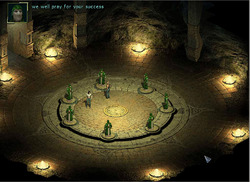TSI's project revealed to be adaptation of Seven Dragon Saga, a sci-fi wuxia-inspired PnP RPG
TSI's project revealed to be adaptation of Seven Dragon Saga, a sci-fi wuxia-inspired PnP RPG
Company News - posted by Infinitron on Tue 19 August 2014, 03:18:49
Tags: David Shelley; Seven Dragon Saga; Tactical Simulations InteractiveSo, the Tactical Simulations Interactive countdown we reported about last week expired today. In its place, came...another countdown, this time 15 days long. Perhaps realizing that was a bit silly, the TSI folks quickly altered the countdown's website. There's still a countdown, but now something of the nature of the game that will be announced has been revealed there - a reference to something called Seven Dragon Saga. What is Seven Dragon Saga, you ask? Evidently, a pen-and-paper roleplaying game developed by the people behind TSI, an additional SSI veteran by the name of Keith Brors, and a non-SSI vet named Gil Colgate. The latter two also work for MMO developer Cryptic Studios, so I guess this is more of a hobby for them. But don't take my word for it, check out the game's website.
A blog post by David Shelley explains:
You can view all of the system's rules and details on the website, including a brief overview of the campaign setting. Now, how all of this weirdness will come together in the form of a nostalgic Gold Box-like CRPG? That remains to be seen.
A blog post by David Shelley explains:
Seven Dragon Saga (SDS) is an unpublished paper and pencil fantasy RPG, which and I my friends have been developing for many years. I may a convert it to a single player computer game in the near future, so I thought I would talk about some of the choices we made and the reasoning behind them. I’m hoping the insight into our processes may help others who want to tweak their favorite system or even create their own.
My friends and I are all designers and engineers in the computer game industry, so we approached things from a technical perspective. The system is designed to model many of the cool effects seen in anime and wuxia (foreign martial arts) films. So the feeling is over-the-top fun, but still balanced to provide challenge and interest.
An additional post explains the system's design philosophy:My friends and I are all designers and engineers in the computer game industry, so we approached things from a technical perspective. The system is designed to model many of the cool effects seen in anime and wuxia (foreign martial arts) films. So the feeling is over-the-top fun, but still balanced to provide challenge and interest.
SDS falls squarely in the simulation category of RPGs, meaning that we have detailed rules covering most aspects of play. Considering our background as computer game designers and engineers, I suppose it isn’t surprising we came down on that side. We find narrative games, where rules are simpler and adjudicated by the GM at play time are fun, but they favor those who can talk best, or manipulate the GM best. Several of our core players are deliberative and structured rules help them get the best out of their characters.
Of course, we have to fight the temptation to create a new algorithm, or create rules which only a computer would keep track of. In a computer version we can have plenty of conditionals, and take into account more variables, but it drains the fun from tabletop play.
We once allowed players to build their attacks from a lot of components (armor piercing x2, extra damage, extra target, etc.), but the min-maxers stopped play to evaluate every situation, and the casual players stuck to the one technique they could remember working. Slow play, big advantage to the min-maxer. Now we allow a single Stunt to modify attacks during the turn. It adds a bit of color and flexibility, without confusing things. And in a computer version we can automate the selection process and give the player just a few attack styles for a given situation.
Of course, we have to fight the temptation to create a new algorithm, or create rules which only a computer would keep track of. In a computer version we can have plenty of conditionals, and take into account more variables, but it drains the fun from tabletop play.
We once allowed players to build their attacks from a lot of components (armor piercing x2, extra damage, extra target, etc.), but the min-maxers stopped play to evaluate every situation, and the casual players stuck to the one technique they could remember working. Slow play, big advantage to the min-maxer. Now we allow a single Stunt to modify attacks during the turn. It adds a bit of color and flexibility, without confusing things. And in a computer version we can automate the selection process and give the player just a few attack styles for a given situation.
You can view all of the system's rules and details on the website, including a brief overview of the campaign setting. Now, how all of this weirdness will come together in the form of a nostalgic Gold Box-like CRPG? That remains to be seen.














